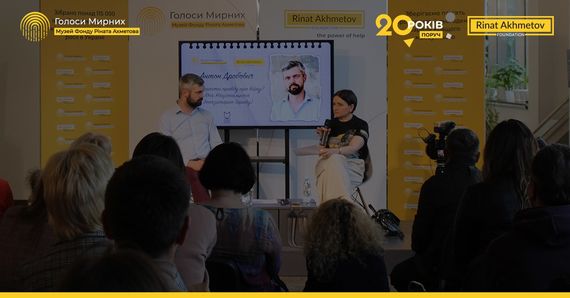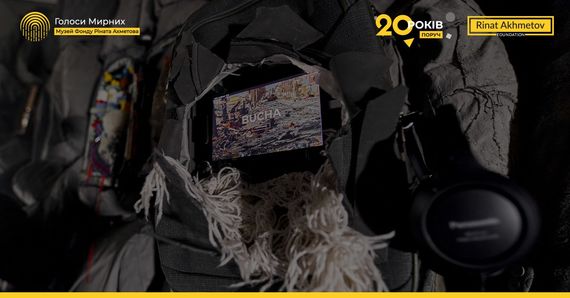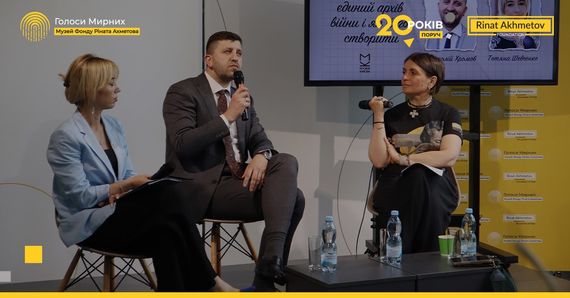“The World Needs to See What Is Happening in Ukraine”: The Museum of Civilian Voices of the Rinat Akhmetov Foundation Brought Together Documentarians to Discuss the War

The 14th Odesa International Film Festival (OIFF) has come to an end. For the first time, the Museum of Civilian Voices of the Rinat Akhmetov Foundation acted as a partner of the Film Industry Office documentary cinema program. Three panel discussions in the framework of the event were focused on various aspects of documentary filmmaking.
Experts discussed how to produce films about war, what is the role of documentary cinema in the development and formation of social institutions, and how to make documentary content understandable to international audiences. The moderator of the discussions was Natalya Yemchenko, Public Relations and Communications Director at SCM and a member of the Foundation’s Supervisory Board.
The first discussion topic was How to make films about war: ethics in communicating with characters, and pitfalls in covering events. One of the speakers was film director and the winner of the National Competition, Maciek Hamela. His film From Where to Where was recognized as the best full-length documentary film at the festival this year. The film received a special prize from the Museum of Civilian Voices.
“The world needs to see what is happening in Ukraine, precisely through the documentary cinematography based on the recording of people’s evidence,” Maciek Hamela is convinced.
The first discussion topic covered the ethics of content creation: when documenting war experiences and communicating with characters, it is important not to harm them.
“It is important to involve psychologists, psychotherapists, and even psychiatrists in the process of film production. And take care not only of the condition of the characters, but also of the film production teams, as they too cannot avoid trauma,” emphasized psychiatrist and psychotherapist Oleh Chaban.
Now, many journalists are starting to work in the field of creative documentary filmmaking. However, the approach to filming a journalistic report differs from the approach to creating a documentary film.
“If a character says he or she does not want to be filmed, you have to accept it. If you already have the material, and the character does not want it to be released, you have to accept it. You cannot put a work of art above the fate of people. Because these are their stories, and you are an observer,” says Ivanna Khitsynska, producer of Babylon’13, founder of Quatros Group, producer of the films The Iron Hundred, and Mariupol Fortress.
How to ethically work with children when shooting films? This topic was covered by Yulian Ulybin, the director of the documentaries Children of Bomb Shelters and The Dram.
“I know each of my characters. The ones I filmed had the opportunity to undergo a rehabilitation course with my support. And it does not happen that once a character comes, I immediately film him or her. If the filming process starts, it may last for a week. So the shooting process is long, and we live as a family. And when the children start talking to you, then everything works out for us,” says Yulian Ulybin.
Children need a particularly balanced and delicate approach. For example, children who were successfully returned after deportation are not immediately ready to talk about their experiences.
“Deportation is just one of the life circumstances. It can be preceded by the death of a father or mother, a bomb shelter with neighbours, a difficult evacuation process, staying in a temporarily occupied territory, relocation to Russia, life in a foster family, and only then the return to Ukraine,” explains Darya Kasyanova, the national program development director of the charity SOS Children’s Villages Ukraine and Head of the Board of the Ukrainian Network for Children’s Rights (civil society organization).
Is it ethical to shoot a fiction film based on real events during the war? According to Iryna Khranovska, chief producer of the TV series section at ICTV and ICTV 2 TV channels, the war should be integrated into the content, and answers should be given as to how to live during this time.
“It is still impossible to cover the events of the war with a complete and comprehensive understanding. Therefore, at this stage, it is worth talking about heroes and shaping such heroes for the audience – reconnaissance officers, volunteers, and doctors. A story about some special operations is also possible,” she clarifies.
You will be able to learn about the other discussions later on the website of the Rinat Akhmetov Foundation.



